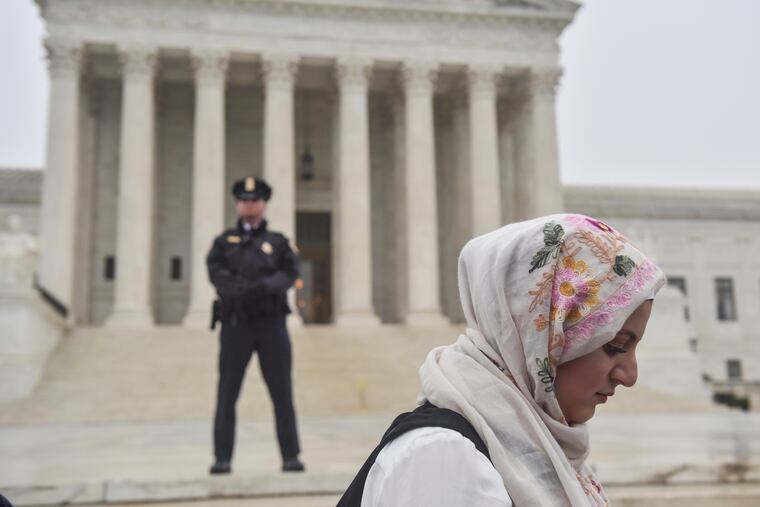Biden ends the ‘Muslim ban’ on day one of his presidency but its legacy will linger | Opinion
I hope the repeal is a moment that the movement for just immigration savors.

President-elect Joe Biden repealed the Muslim ban on his first day in office, consistent with his immigration platform. The first Muslim ban was signed by President Donald Trump on Jan. 27, 2017, creating chaos and protest around the nation’s airports.
The latest version of the ban came from a September 2017 proclamation that was expanded in January 2020. It excluded certain nationals from thirteen countries: Iran, Libya, North Korea, Somalia, Syria, Yemen, Burma, Eritrea, Kyrgyzstan, Nigeria, Sudan, Tanzania, and Venezuela. The Trump administration relied on a section of the Immigration and Nationality Act to issue the travel ban. That section states: “Whenever the President finds that the entry of any aliens or of any class of aliens into the United States would be detrimental to the interests of the United States, he may by proclamation, and for such period as he shall deem necessary, suspend the entry of all aliens or any class of aliens as immigrants or nonimmigrants, or impose on the entry of aliens any restrictions he may deem to be appropriate.”
While the language is broad, litigants argued that the language is not unfettered, and must be applied in ways consistent with the immigration statute as a whole.
Lawyers and immigration scholars also argued that the Muslim ban clashes with another section of the statute called 202(a) which “prohibits discrimination ‘because of race, sex [or] nationality’ “ in issuing immigrant visas.
» READ MORE: Under Trump, hundreds of small changes in immigration rules have had a huge impact
In a 5-4 decision in June 2018, the Supreme Court of the United States in Trump v. Hawaii upheld the legality of the Muslim ban on both statutory and constitutional grounds.
Regardless, the human impact of the Muslim ban has been profound. I’ve seen it myself working with communities in Pennsylvania. While public attention to the Muslim ban faded, the human consequences endured, as the government continued to exclude people for no other reason than where they were born.
U.S. citizens and green card holders have been separated from their spouses despite being in a legally qualifying relationship under the immigration statute. Parents have missed the milestones of their children. As one attorney told me: “The common thread I see among every single person that walks into my office is, I need my mom because I’m gonna be in labor and I can’t do this without her. Or, I’m the first person in my family to get a Ph.D.; it would mean the world to my parents to be there at my graduation ceremony. Or I’m in love and I’m getting married and I’m getting engaged and this is a huge moment in my life and I would like my parents to meet my future husband. ... Graduations, birth of a child, engagement, weddings; all of them are destroyed for people [because of the Muslim ban].”
As of Jan. 1, 2019, more than 9,000 spouses and minor children of U.S. citizens had been barred, according to the Cato Institute. The Muslim ban is, in many ways, an untold story of family separation.
Resistance to the ban was significant and revealed itself inside courts, on the streets, and at consulates. It also arose in the halls of Congress with the introduction of the NO BAN Act, which if enacted would limit the exclusionary authority of the immigration statute and repeal the Muslim ban. The lawyering and advocacy exercised in the last four years to challenge the Muslim ban is an important part of the history, one I hope lands in the books read by our children and grandchildren. It is a fight that evokes the words of Doris Lessing: “Whatever you’re meant to do, do it now. The conditions are always impossible.”
We are entering a chapter where a new president repeals the Muslim ban. How this story ends will depend on the details and how the Biden administration handles the residual effects. But I hope the repeal is a moment that the movement for just immigration savors.
Shoba Sivaprasad Wadhia is a law professor and immigration scholar at Penn State Law at University Park. She is the author of two books: Beyond Deportation: The Role of Prosecutorial Discretion in Immigration Cases (NYU Press) and Banned: Immigration Enforcement in the Time of Trump, (NYU Press).